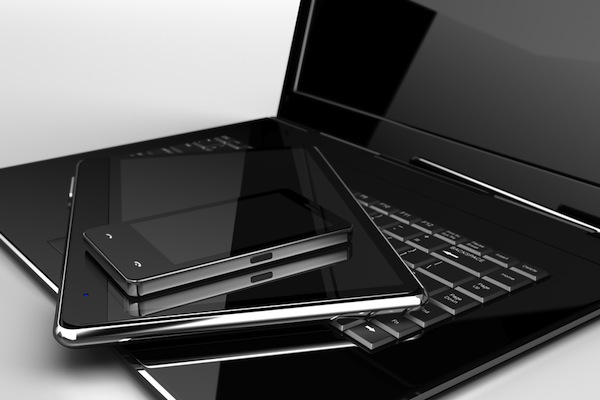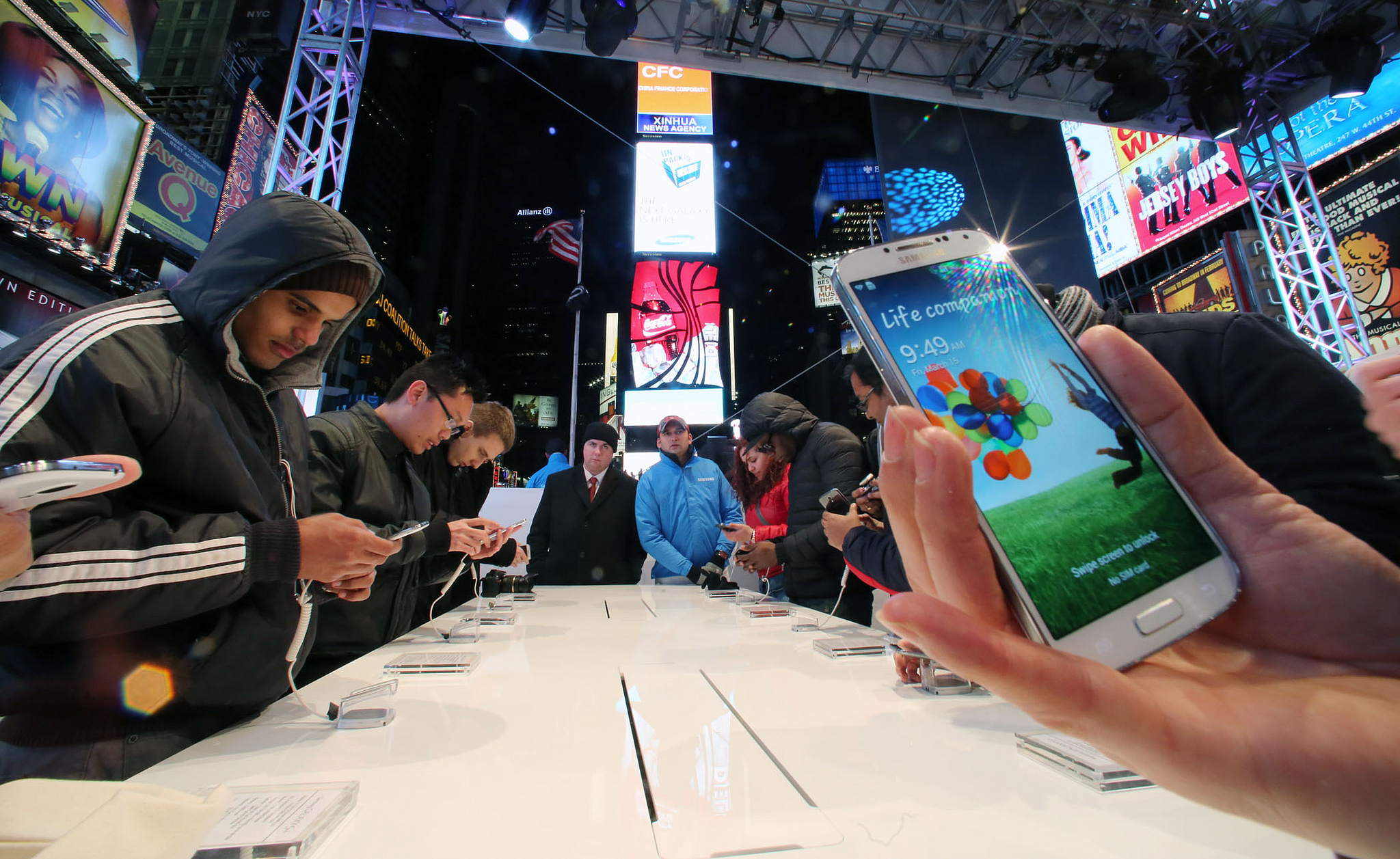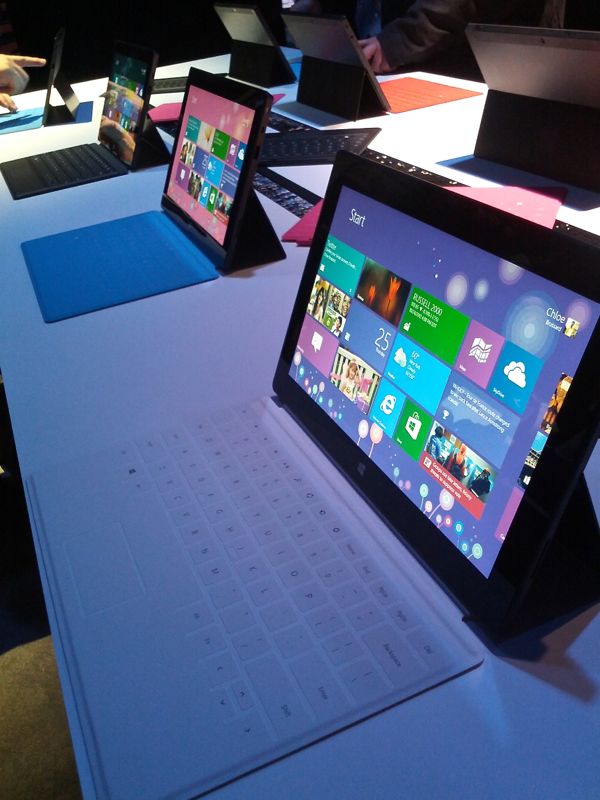
Enterprise security at risk in the post-PC era
Almost three quarters (73 percent) of US-based office workers with enterprise-issued tablets have used them to download personal software and apps. A new survey carried out for content collaboration specialist Huddle by IPSOS-Mori reveals this and other potential security risks resulting from blurred lines between personal and enterprise devices.
The nationwide survey of 2,000 US office workers shows that 62 percent download personal software to company-owned smartphones and 45 percent do the same on laptops. The majority of the 44 percent of office workers using company-issued devices download personal software such as iTunes, Spotify and Dropbox. In addition 52 percent admit to storing, sharing and working on work documents via their personal smartphones, tablets and laptops.

Secure Work Space for Android and iOS arrives in BlackBerry Enterprise Service 10
On Tuesday, BlackBerry announced the availability of Secure Work Space for Android and iOS in BlackBerry Enterprise Service 10. The tool, which was unveiled little over three months ago, is designed to provide a safer and BYOD-friendly environment with features like application-wrapping and containerization.
"It offers BlackBerry Balance-like capabilities to provide peace of mind for IT departments in a BYOD environment, while separating personal content for personal use", according to the Canadian maker. BlackBerry's reasons for beefing up the security of Android and iOS devices revolve around expanding needs and the "ever-growing variety of devices" brought into the work space.

Tablets dance over PC's grave
Few are those who still profess a bright future for PCs and, starting today, even fewer will. According to IDC's latest forecast, in 2013 the PC market is expected to take another dive with shipments dropping by 7.8 percent. This is triggered by a shift in computing needs as users look for more versatility and less raw power.
"As the market develops, usage patterns and devices are evolving", says IDC program vice president Loren Loverde. "Many users are realizing that everyday computing, such as accessing the Web, connecting to social media, sending emails, as well as using a variety of apps, doesn't require a lot of computing power or local storage". Naysayers, it's time to face the music -- the average user can get away with a tablet or smartphone to get the job done.

Sourcefire unveils new techniques to uncover malware sources
For even the most security minded individuals and organizations, malware continues to be a serious problem. It is all well and good knowing that your system has become infected and ensuring that you have the tools to perform a clean-up operation, but the key to avoiding future problems is determining the source of infections.
This is what Sourcefire aims to achieve with its new Network File Trajectory and Device Trajectory techniques. The company points out that in modern work environments the BYOD (Bring Your Own Device) model is becoming increasingly common. It is one thing to protect your own machines, but quite another to secure any device that may connect to a network.

Expect employers to make you pay for devices, even if you don't want to
Here's a question for you: Is a company-provided device a benefit? You don't pay for hardware, software or service but might get older gear as hidden personal cost. I ask, because if Gartner is right, you'll soon pay, whether or not you want to. A survey of CIOs finds that 38 percent of companies plan to stop providing employees with devices by 2016. Wait a bit before reading on and think about what that really means.
"We're finally reaching the point where IT officially recognizes what has always been going on: People use their business device for nonwork purposes", David Willis, Gartner vice president, says. As someone working from home full time since May 1999, I must confess to rarely using company-issued computers or other devices. But that was my choice, and one often not supported by IT departments. Now, for many workers, there will be only choice of bringing their own.

Symantec: Majority of businesses believe BYOD is ‘worth the risks’
Not every business embraces BYOD (Bring Your Own Device). The reasons for rejecting it are usually down to security concerns -- firms are understandably worried about their data falling into the wrong hands if the device gets lost or stolen once it leaves the building.
Security specialist Symantec surveyed 236 attendees at this year’s Symantec Vision, its annual user and technical conference held at the MGM Grand in Las Vegas, to find out how companies were handling BYOD, and despite the small sample size the results were interesting:

The enterprise will never embrace Apple
First in a series. If there is one company that clearly doesn't care about the corporate world, it is Apple. As iOS continues to forge flagship status as Apple's core offering, OS X gets second-class-citizen treatment in every possible way from the Cupertino, Calif.-based company. While the enterprise reluctantly builds out BYOD (bring your own device) initiatives to support usage of Apple devices at the workplace, this is a far stretch from openly embracing iOS or OS X as viable corporate platforms. Apple's presence in the boardroom is due to bottom-up organic acceptance as opposed to top-down purposeful planning.
By even conservative estimates, the enterprise IT market is massive, and growing steadily as the recession continues to recede. IDC recently pinned US corporate IT spending for 2013 at $474 billion, a 6 percent increase over the previous year. And globally, Gartner says that this figure is closer to $2.679 trillion, which represents a 2.5 percent year over year bump. Yet while Apple's sales in phones and tablets continues to stay consistently solid, the company's attitude towards enterprise hasn't changed one bit. For lack of a better description, top Apple executives just "don't care".

Why I'm not impressed by the new Samsung Galaxy S4
When I was expecting an exotic dish that would blow my mind just by looking at it, Samsung yesterday served up a plain, simple and frankly overdone spaghetti Bolognese. The new Galaxy S4 might just be the best Android smartphone that Samsung has ever made, but it's not as "awesome" or "innovative" nor filled with "innovation" as the company would lead us to believe. It's a wife with some nip and tuck instead of a hot supermodel.
Instead of being smitten by the Galaxy S4 I was left with a bitter taste in my mouth: Haven't I seen some of those features already in older smartphones? Admittedly, there are some impressive ones out there -- like Dual Camera and Dual Video Call -- but generally speaking Samsung appears to have focused more on delivering a huge number of features rather than focusing on fewer truly innovative ones.

Samsung fortifies BYOD with Knox for Galaxy devices
On Monday, South Korean electronics manufacturer Samsung unveiled a new "end-to-end secure solution" aimed at boosting the company's BYOD (Bring Your own Device) credentials among businesses. Called Knox, the product beefs up the Samsung For Enterprise (also known as SAFE) program by adding improved security and increased manageability into the mix.
This time around Samsung forgoes the acronyms. Unlikely to be just a simple coincidence, Knox bears a military connotation as it hints at the iconic Fort Knox US Army post in Kentucky. Luckily, Samsung's Knox only deals with defense. The enterprise solution packs Security Enhanced (SE) Android, which is developed by the NSA (United States National Security Agency) to improve security within green droid land, and integrity management services that are implemented in the Android framework and the hardware alike.

Samsung says the Unicorn Apocalypse is coming -- BlackBerry users unprepared
To be frank, acronyms like "SAFE" and "BYOD" are not overly exciting, especially when combined with words like "business" or "enterprise". There's just something missing that makes related adverts unappealing and boring. Samsung, however, begs to differ and has meshed all those terms together with unicorns to create two rather cool video ads.
The two commercials are, at core, related to SAFE, which is short for Samsung for Enterprise, and the BYOD (Bring Your Own Device) movement but with an emphasis on entertainment rather than bombarding the viewers with too many technical details. At the same time the South Korean corporation did not pass on mocking BlackBerry devices, once known as the business world's top choice for at-work smartphones.

Red Hat acquires ManageIQ
Concurrent with third-quarter earning results late this afternoon, Red Hat announced plans to acquire ManageIQ, an enterprise cloud provider. The all-cash deal is for $104 million. Red Hat is uniquely positioned, opportunity and risk, for enterprise server consolidation and transition to private clouds -- for which virtualization is a linchpin technology. The Raleigh, N.C.-based company plans to expand its own capabilities by fitting ManageIQ's monitoring and management tools onto existing solutions.
Red Hat's acquisition rides the cusp of a trend. Last month, IDC forecast big cloud-related mergers for 2013 -- totaling $25 billion over 20 months. The analyst firm sees three converging trends vertically related. "The IT industry as a whole is moving toward the mobile/social/cloud/big data world of the 3rd Platform much more quickly than many realize: from 2013 through 2020, these technologies will drive around 90 percent of all the growth in the IT market," Frank Gens, IDC chief analyst, says. "Companies that are not putting 80 percent or more of their competitive energy into this new market will be trapped in the legacy portion of the market, growing even slower than global GDP.

SAP announces major update to Afaria Mobile Device Management
German enterprise software leader SAP on Tuesday unveiled a major update to its Afaria mobile device managment solution which will be released to customers on December 21.
SAP focused on three key areas for this release: applications management, ease and depth of new device integration, and of course, platform support.

Will you buy Microsoft Surface Pro?
Last week, Microsoft released pricing on Surface tablets running Windows 8 Pro: $899 (64GB), $999 (128GB). Controversy followed, with the Apple Fan Club of analysts, bloggers, reporters and other writers fanning the flames of misinformation (as they so often do). These nitwits say Surface Pro is overpriced, because iPad costs so much less. But iPad is the wrong comparison to make. I say Microsoft prices Surface Pro against MacBook Air and ultrabooks, which makes loads of sense when looking at the chip architecture (x86, not ARM), configuration (similar to MBA for cost) and operating system (developed for desktop PCs not mobile devices).
I rebutted loony iPad comparisons with post "Microsoft Surface Pro is NOT overpriced". Compared to MacBook Air or ultrabooks, Surface is competitively priced, which was my point -- that and getting sensible analysis out there. But properly priced against competing devices isn't the same as being right for your budget or what you're willing to spend. Apple commands a premium brand, for which people pay more, happily. Then there is ultrabook, which didn't lift PC sales during second and third quarters as Intel and its OEM partners hoped. The costlier laptops simply aren't selling well. Ultrabooks' failure to wow foreshadows big, potential sales problems for Microsoft, which brand doesn't carry the same price premium as Apple's.

Dell tackles BYOD with Wyse PocketCloud for Windows RT, iPad and the Web
It's another cloudy day in the technology world. No, I am not referring to the rain-snow event we are experiencing here in my beloved mid-Atlantic region, but instead to the IT version of the "cloud", the buzzword with which you should all be well familiar. Dell, formerly a leading hardware provider, is also a player in this game.
The Wyse PocketCloud service isn't new, but its name may not be as well known as other cloud services. With today's announcement, Dell is trying hard to make PocketCloud more recognizable so it may capitalize on the "BYOD" trend.

Panorama9 adds Mac patch management to new cloud IT service
Cloud IT management platform Panorama9 on Tuesday introduced Mac patch management to its pay-as-you-go solution, unifying Windows and Mac OS patch deployment in its IT dashboard.
We first looked at Panorama9 in October when the company added Mac and Linux support to its contract-free asset and compliance management platform. The service itself is still very new, and is rapidly growing its functionality in the interest of providing small and medium sized businesses affordable cloud IT services.
